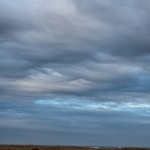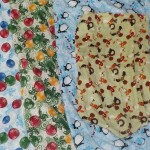The silver maple tree arranges herself for winter, as she has for the previous twenty-seven years. Her leaves, which she so carefully drew forth in spring’s growing warmth, now thin and turn a deep red. She pulls her sap in more tightly; it may be a hard winter this year, and she needs to conserve the resources she has for the long sleep to come. She’s rather proud of the growth she’s put on this year, touching high-flying breezes that were beyond her highest branches just a couple of years before.
Drat. It’s gone noisy again. The maple’s used to humans; she’s been surrounded by them her entire life. It was human hands that moved her from her original home out in the countryside, surrounded by hundreds of other young maples, to this tiny strip of land between a sidewalk and a curb. She’s had plenty of company since then, humans and squirrels and birds and even the occasional rat, but none quite so noisy as this one. He’s here every week as soon as her leaves begin to drop, blowing them away into piles with great noise and breath carried in a package on his arm. He scoops the leaves up and takes them away, and he does this every year.
What would he do with all of them, anyway? Other humans have now and then picked up a leaf or two. But he takes them all, or at least every one he can find. It leaves the grass open and bare beneath her. She’s never cared for the grass, with their tickly little roots and unusual ways, all of them thinking together at once. They speak like fungi, she thinks. She should be a little kinder to the grass, though; they have to suffer being cut and torn every week when the man arrives, even before the leaves have begun to shed. And he takes away what he cuts from them, too.
It reminds her of something she remembered faintly in her youth. She grew up on the very outer edge of her home, out where the wild trees grew with no one to water them or attend to their needs or treat their illnesses. There, too, her leaves (much fewer in number then, she had been so tiny!) had been collected, though by a different person, a woman that time. But the woman never took the leaves of the wild trees, though they produced huge numbers each year. Perhaps humans only wanted the leaves of silver maples; the field beyond teemed with big leaf maple and cottonwood by the water, and a variety of conifers that held tightly to their own leaves even in the dead of winter.
She once asked one of the big leaf maples, whose branches extended almost to her own little plot, why no one took the wild trees’ leaves. The big leaf was a tall, broad mother of many saplings, some of whom had even survived to grow beside her, and with much patience gained over the years the mother tree asked Why do the humans take some of your sustenance from you? You worked so hard to pull together your finery; why let them steal it?
The young maple hadn’t understood at the time; the piles of dried leaves and decaying mustiness at the roots of the mother tree didn’t seem particularly fine or desirable. But she saw how healthy the wild trees were, those that had survived shade and wind and branch-shattering ice. Maybe there was something to the leaves; maybe it wasn’t a good thing that the humans took them away every year and let the grass grow instead.
Bah. Sleepiness courts the maple, and that brings idle thoughts. The humans thought to bring her here; they must have had some reason. And so they must have a reason for sending the man to take the leaves. Anyway, he’s done with his noisy business, and it will be a few hours before the noise of the evening’s movements begins anew, when all the humans rush about in many directions like ants from an overturned stone. Best to enjoy the quiet and let the wind carry the last few leaves down to the ground.
**************************
Lupa’s note: I wrote this story about a silver maple that lives across the street from my apartment. Every fall, a maintenance person takes away the leaves, and the tree is left with fewer nutrients. Trees can’t adapt quickly to the changes we put them through; this maple can’t decide to grow fewer leaves, or absorb them into her body to get the nutrients she’d normally absorb through decomposed leaves. She’s just doing what she and countless other trees have done for millions of years, and the changes we make to the landscape don’t affect that.
Leaves are an incredibly important resource to an ecosystem, even an urban lawn strip with a few trees on it. Leaves are made from nutrients that the tree gathered from the soil and air, and deciduous trees have evolved to drop the leaves, which are broken down by animals and microbes on the ground, and then the nutrients are released into the soil again so the trees can take them up again. By removing the leaves from your lawn, you are consistently depleting your soil of nutrients, making it more likely that everything growing on it will become weaker and more likely to be diseased. And by growing grass underneath the trees, you’re adding to the competition the tree has to deal with for resources, never mind how water-inefficient lawns are. In nature, your grass would quickly be overgrown by plants that are better suited for growing in the shade of trees; lawns are an unnatural act.
Every year Americans (and others) rake up thousands of tons of leaves in autumn, and most throw them away or leave them for the city to pick up. I’ve asked people why they do that–“Leaves kill the grass” is the most common reply. And then they often feed the lawn and trees fertilizers made with harsh, toxic substances to make up for the nutrients they’ve taken away by not allowing the leaves to decay naturally. This disrupts the entire health of the soil, from the plants and animals that live there, to the fungi that are absolutely crucial to soil health and plants’ ability to absorb nutrients, and even how well the soil can resist erosion. Because we’ve chosen to have unnaturally perfect lawns, we’ve destroyed countless acres of land that can only grow plants using Monsanto’s toxic products.
So this autumn, say no to rakes and leafblowers, to back-breaking labor and obnoxious noise. Feed your trees what they are supposed to have, the nutrients they themselves collected, not artificial nitrogen-pumped fertilizers that pollute the soil and water. If you want to speed up the process you can run over the leaves with a mower or even create a compost bin so you can break them down into natural fertilizer that you can spread on the ground next year. Stop wasting these precious resources that your soil needs to be healthy–leave the leaves!












